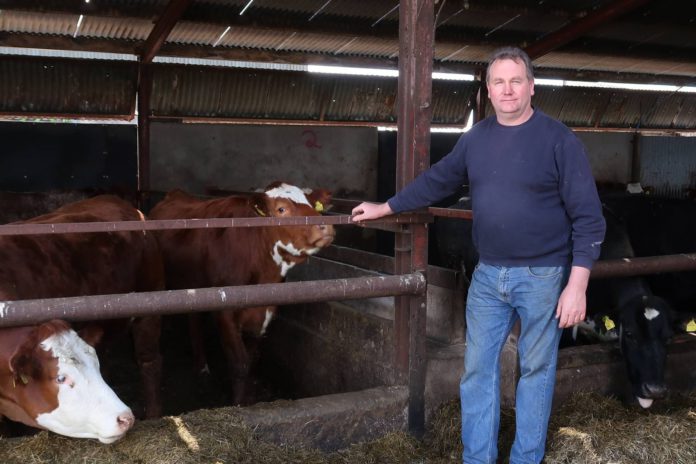According to an interim report by the Agri-Food Biosciences Institute (AFBI), Business Development Groups (BDGS) Scheme has made a difference to farm businesses.
One farmer who has been making changes to his enterprise due to the BDG scheme is Glenn Ross from Markethill, Co Armagh.
He runs a mixed farm with 100 ewes and 30 suckler cows and targets to sell all stock finished. However, he does sell quality stores if market conditions permit.
He joined the local sheep and suckler cow BDGs which both meet six times a year for training events Brian Hanthorn, CAFRE Beef and Sheep Adviser and Adam Jones, AI Service Specialist Technical Facilitator lead.
Through sharing knowledge and with challenge and encouragement from the other members of the group, Glenn has been increasing the focus on animal health and improving the fertility and productivity of both the ewes and cows.
He has introduced a rotational grazing system to improve grass growth and utilisation and reduce the amount of concentrates used.
Furthermore, he has been benchmarking the farm enterprise performance to monitor how the changes are improving profitability.
Using technology is important, and Glenn has completed soil analysis, introduced a calving and heat detection monitoring system, and is currently making his own electronic cattle weighing scales.
Glenn says: “With better grass management, I hope to push cow numbers to 40 over the next couple of years. Being in the group has given me a number of ideas about how to make my farm better, and confidence that I am doing a good job but can make improvements.”
Business Development Groups having positive effect on gross margin
Fiona Dickson of CAFRE’s Agri-business Branch explained that the report showed that, after two years, being in a BDG had a positive effect on gross margin for dairy, sheep, suckler cow and beef finishing enterprises.
Also, the report showed that the improvement was statistically significant for dairy enterprises.
The College of Agriculture Food and Rural Enterprise (CAFRE) has delivered the scheme for five years. Over 3,000 farm businesses regularly attend training events, which help develop productivity, sustainability, and profitability.
CAFRE stated it “remains focused on successful delivery for the remaining two years of the BDGs scheme”.
Over the last year, during the global pandemic, the quality of scheme delivery has been maintained using online technology. The Education and Training Inspectorate (ETI), acknowledged this during a baseline review of CAFRE’s delivery and remote learning.
Looking ahead, CAFRE will re-commence on-farm delivery of the scheme when it is safe to do so.
Face-to-face delivery encourages peer learning and social interaction through practical discussion and demonstration. However, it is likely that a blended approach will be used to build on the success of the scheme.
AFBI will complete a final evaluation to determine the overall impact of the scheme on farm businesses.
The BDGs Scheme is funded by the Department of Agriculture, Environment and Rural Affairs and the European Agricultural Fund for Rural Development.





